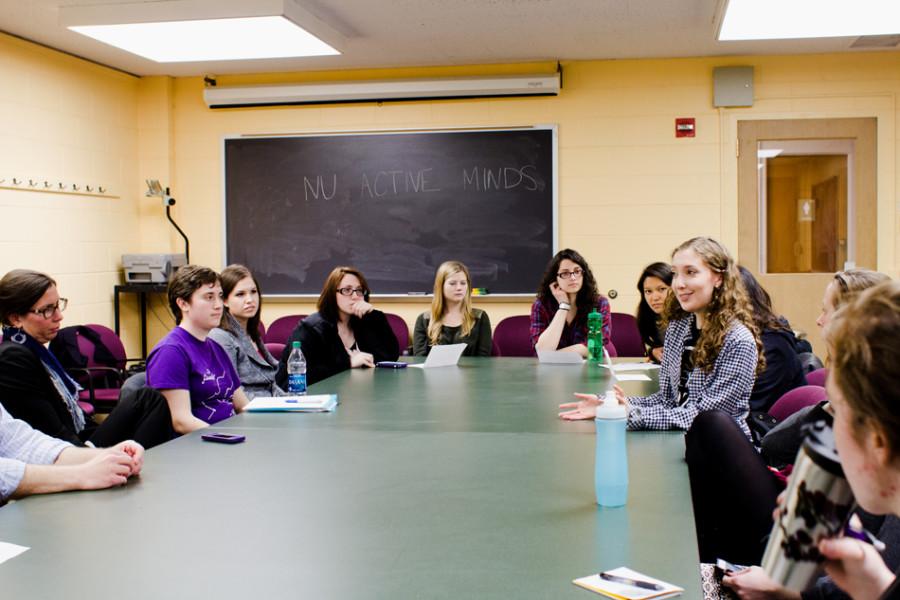Panel addresses misconceptions about Northwestern’s mental health services
Connie Wang/The Daily Northwestern
Students and administrators discuss Northwestern’s mental health resources at a panel Thursday night. The panel hosted by NU Active Minds touched on leaves of absence and criticisms of mental health services at NU.
May 1, 2015
Students, staff and administrators discussed Northwestern’s mental health resources, taking leaves of absence and how campus culture impacts students’ mental health at a panel Thursday night.
The panel, titled “Northwestern’s Mental Health Services: DEBUNKED,” was hosted by NU Active Minds and included representatives from Counseling and Psychological Services, Weinberg Academic Advising and the Dean of Students’ office. Fifteen students attended the event.
Mona Dugo, associate dean of students in student assistance and support services, urged overwhelmed students to not think they are stuck on a fixed academic path.
“Students at Northwestern come in and they have this trajectory in mind — ‘I’m going to do this, I’m going to take this sequence of classes, it’s going to happen this quarter’ — and it’s very hard for students to let go of that idea that they had,” Dugo said. “Really, the truth is that we can always work it out academically.”
Although the panelists stressed students shouldn’t feel they will be forced into taking a leave of absence when they seek help, they said it can be a good option for students who are struggling. NU gives a full tuition refund for the quarter in which students take a leave of absence, Dugo said, and students’ transcripts do not record leaves of absence.
“There are certain situations when the consequences of staying at Northwestern are worse than taking time off,” said David Shor, director of clinical services at CAPS.
Shor addressed the counseling center’s negative reputation among students, saying feedback from students who actually use its services is overwhelmingly positive. He also spoke to concerns about CAPS’ 12-session limit, which, he said, does not include the intake session, crises or other counseling resources such as group counseling.
“In the event of a crisis … if someone walks in and says I need to see someone, they’ll be seen, if not right away, then within 20, 30 minutes,” regardless of whether they’ve used all their individual sessions, Shor said.
Once students reach that limit, many are concerned about paying to continue counseling, said Weinberg adviser and linguistics Prof. Brady Clark.
“It’s very frustrating and frightening to hear students say, ‘Well, I don’t want to use up these 12 sessions because I don’t know how I’m going to pay for care after that,’” he said.
Shor said CAPS partners with local practices and works with students to ensure they can find affordable one-on-one counseling.
The panel also focused on resources available to students outside one-on-one counseling from CAPS, including other support it offers as well as programming through the Women’s Center, the Center for Awareness, Response and Education, NU Listens and academic advising.
NU Active Minds originally intended to host a panel about taking leaves of absence, said co-president Ary Hansen, but expanded it to look more broadly at mental health services at NU.
“There have been, in my experience, a lot of misperceptions about CAPS,” the Weinberg junior said. “We thought it would be a really good idea to bring in people who could address that.”
Email: [email protected]
Twitter: @MadelineFox14


